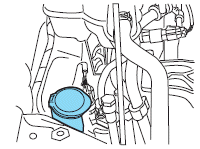Windshield washer fluid
Add fluid to fill the reservoir if the level is low. In very cold weather, do not fill the reservoir completely.

Only use a washer fluid that meets Ford specifications. Do not use any special washer fluid such as windshield water repellent type fluid or bug wash. They may cause squeaking, chatter noise, streaking and smearing.
Refer to the Maintenance product specifications and capacities section in this chapter.
State or local regulations on volatile organic compounds may restrict the use of methanol, a common windshield washer antifreeze additive.
Washer fluids containing non-methanol antifreeze agents should be used only if they provide cold weather protection without damaging the vehicle’s paint finish, wiper blades or washer system.
![]() WARNING:
If you operate your vehicle in temperatures below 40°F (5°C), use washer fluid with
antifreeze protection. Failure to use washer fluid with antifreeze protection in
cold weather could result in impaired windshield vision and increase the risk of
injury or accident.
WARNING:
If you operate your vehicle in temperatures below 40°F (5°C), use washer fluid with
antifreeze protection. Failure to use washer fluid with antifreeze protection in
cold weather could result in impaired windshield vision and increase the risk of
injury or accident.
Note: Do not put washer fluid in the engine coolant reservoir. Washer fluid placed in the cooling system may harm engine and cooling system components.
Checking and adding washer fluid for the liftgate
Washer fluid for the liftgate is supplied by the same reservoir as the windshield.
See also:
Interior mirrors
WARNING: Do not adjust the mirror when your vehicle is moving.
Note: Do not clean the housing or glass of any mirror with harsh abrasives,
fuel or other petroleum or ammonia based cleaning products ...
Navigation system
Note: The navigation SD card must be in the SD card slot to operate the
navigation system. If you need a replacement SD card, see your authorized dealer.
Note: The SD card slot is spring-loaded. To ...
Jump starting
WARNING:
The gases around the battery can explode if exposed to flames, sparks, or lit cigarettes.
An explosion could result in injury or vehicle damage.
WARNING:
Batteries contain sulfuric a ...
